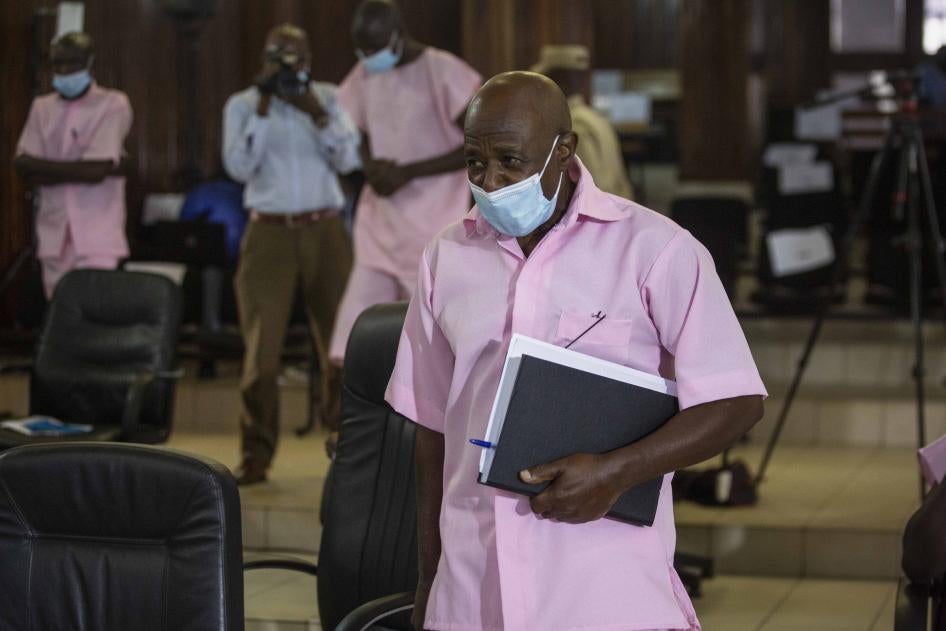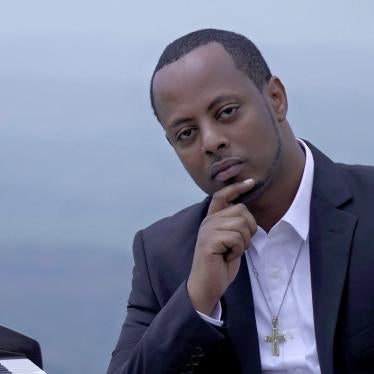An apparent mistake has confirmed what most of the world already knew: government critic Paul Rusesabagina is unlikely to receive a fair trial in Rwanda. In a recorded video call, Rwanda’s justice minister, Johnston Busingye, admitted the government’s role in the August 2020 enforced disappearance, illegal transfer, and fair trial rights violations of Rusesabagina, whose trial on terrorism charges began on February 17.
Al Jazeera broadcast excerpts from a call between Busingye and two consultants from the British PR firm Chelgate, which Al Jazeera said was “inadvertently” shared with them. In the clips, Busingye admits that Rwandan prison authorities intercepted privileged communications between Rusesabagina and his lawyers, in violation of his due process rights.
Busingye also admitted the Rwandan government paid for the flight that brought Paul Rusesabagina, a Belgian citizen and US green card holder, from Dubai to Kigali on August 27, 2020, claiming it was legal. At the time, Human Rights Watch found that Rusesabagina was the victim of an enforced disappearance for three days while in the custody of Rwandan officials or their proxies. Rusesabagina has said that he was not aware of where he was and was kept blindfolded with his hands and feet bound.
When authorities deprive someone of their liberty and refuse to acknowledge the detention, or conceal the person’s whereabouts, they are committing an enforced disappearance, a crime under international law. Enforced disappearances, often leading to torture and unfair trials, have become a regular practice in Rwanda under Busingye’s watch.
Extradition proceedings overseen by an independent tribunal are required to assess whether a suspect’s rights will be guaranteed. The Rwandan government continues to change its tune on how Rusesabagina was taken into custody and transferred to Rwanda. Despite this, on February 26, Rwanda’s High Court Chamber for International and Cross-border Crimes ruled that it has jurisdiction to try him.
Busingye’s admission that the Rwanda Correctional Service (RCS) has been reading correspondence between Rusesabagina and his lawyers violates Rwandan and international legal standards, which protect all communications and consultations between lawyers and their clients within their professional relationship as confidential. The government’s subsequent claim that the RCS had mistaken privileged for non-privileged communications rings hollow.
Busingye’s revelations only undermine further the idea that Rusesabagina could ever get a fair, credible trial in Rwanda and that victims of the attacks he is accused of supporting will see justice delivered.
|
Dispatches
Rwandan Judiciary Under Scrutiny
Interception of Rusesabagina’s Attorney/Client Communications Raises Concerns
Your tax deductible gift can help stop human rights violations and save lives around the world.
Most Viewed
-
November 25, 2019
A Dirty Investment

-
May 12, 2025
The Gig Trap

-
September 30, 2024
“They Destroyed What Was Inside Us”

-
January 23, 2018
Hidden Chains

-
September 9, 2018
“Eradicating Ideological Viruses”






